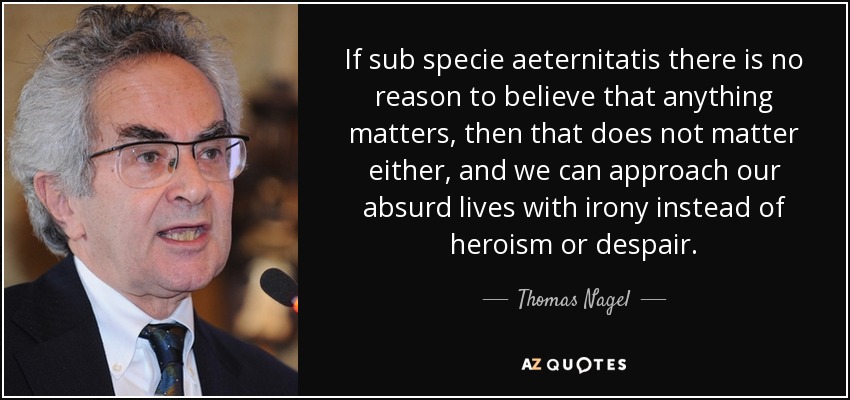
In the West, ever since Fyodor Dostoevsky wrote Notes from the Underground, there have been philosophical counterarguments and challenges to Existentialism, some of which fall under determinism in the debate against free will (the latter of which Existentialist thinkers side with), but they tend to be insufficient because, for how strict and technical they are in interpreting scientific laws and rules, they still have to acknowledge the prevalence of a mystery or higher justification behind determinism.
One of the few Western philosophers that I think has successfully, for a lack of better words, "proved" the fallacies of Absurdism and to a lesser extent, Existentialism, is Thomas Nagel, whose main interests are the philosophy of the mind, consciousness, politics, and ethics. In his essay The Absurd, he questions why life may feel absurd along with where the theory of absurdity emerges.
Firstly, Nagel fires a shot at the assumption that life is meaningless because none of our actions nor those of past and future generations have any meaning nor will matter in millions of years. He goes along with the idea that we are indeed "tiny specks in the infinite vastness of the universe; mere instants even on a geological time scale," (717) yet refutes the claim that any of this makes life absurd or heavy. Instead, Nagel reasons that existence and life is meaningful without any need for reductionist theories.
...life does not consist of a sequence of activities each of which has as its purpose some later member of the sequence. Chains of justification come repeatedly to an end within life, and whether the process as a whole can be justified has no bearing on the finality of these end-points. No further justification is needed to make it reasonable to take aspirin for a headache, attend an exhibit of the work of a painter one admires, or stop a child from putting his hand on a hot stove. No larger context or further purpose is needed to prevent these acts from being pointless. (717)
In other words, Camus has misrepresented the process of justification as a mere retreat from death and absolute ends. But that is not to say that Nagel thinks that logic and rationales go above everything else; he seems to agree with Camus that existence itself is overwhelmingly vast and thus impossible to fully express, it is just that Existential philosophies tend to move in a rather vacuous direction to compensate with said vastness.
Later on in the essay, Nagel reviews Myth of Sisyphus. As we all know, Camus's essay advocates for Sisyphus, the proletariat of Greek mythology and a tragic hero, to defy the gods and to defy the supposed authority in our lives. This, Camus thought, was the only way to salvage our dignity and be true to ourselves. Here is what Nagel has to say:
Later on in the essay, Nagel reviews Myth of Sisyphus. As we all know, Camus's essay advocates for Sisyphus, the proletariat of Greek mythology and a tragic hero, to defy the gods and to defy the supposed authority in our lives. This, Camus thought, was the only way to salvage our dignity and be true to ourselves. Here is what Nagel has to say:
This seems to me romantic and slightly self-pitying. Our absurdity warrants neither that much distress nor that much defiance. At the risk of falling into romanticism by a different route, I would argue that absurdity is one of the most human things about us: a manifestation of our most advanced- and interesting characteristics. Like skepticism in epistemology, it is possible only because we possess a certain kind of insight-the capacity to transcend ourselves in thought. (726-727)He wraps up his essay concluding that it is irony, not despair or heroism, that constitutes Absurdity. I would elaborate further, but the essay is better read than paraphrased. I'm just a student of literature, not of philosophy, after all. Below is a link to The Absurd:
https://philosophy.as.uky.edu/sites/default/files/The%20Absurd%20-%20Thomas%20Nagel.pdf

No comments:
Post a Comment
Note: Only a member of this blog may post a comment.